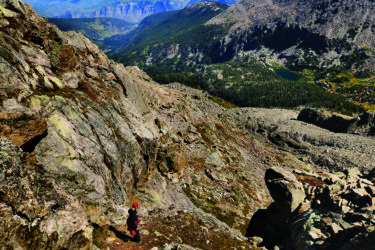The Local newsletter is your free, daily guide to life in Colorado. For locals, by locals.
The Colorado sunlight sparkles off pristine snow that looks as if someone sprinkled a giant spoonful of sugar crystals across the mountainside. The blue sky matches Owen Richard’s Black Diamond jacket as he stands atop Montgomery Bowl and looks out over the range of jagged mountains that unfurl in front of him like a postcard.
Richard points out peaks and mountain ranges that he has explored on various backcountry trips. As the director of the Diamond Peaks Ski Patrol (DPSP), a group of volunteers that provide backcountry search and rescue and safety education, he has an intimate relationship with the northern Colorado peaks that surround Cameron Pass.

That knowledge is more important than ever as hordes of people venture out into the backcountry. Colorado’s 2020-21 avalanche season tied for the deadliest on record with 12 fatalities, according to the Colorado Avalanche Information Center. This season, there have already been three deaths in the backcountry, including one on Cameron Pass, which Richard and his team responded to on Christmas Eve. “We have reported much larger numbers of people and vehicles up near Cameron Pass,” Richard says.
Established in 1990, the DPSP was created following the closure of Hidden Valley Ski Area in nearby Rocky Mountain National Park to provide backcountry education, emergency care, and rescue services for Cameron Pass and the surrounding areas, including Blue Lake and Montgomery Pass. The U.S. Forest Service helped establish the group, which was initially made up mostly of former members of the Hidden Valley patrol. Eventually, a coordinator position was created to organize the group’s activities and allow it to grow. Currently, DPSP has 53 volunteers, most of whom are from northern Colorado, and joined for the education and training. They take shifts patrolling the slopes every weekend, as well as on some weekdays.
Backcountry ski patrols are rare. There are currently only an estimated 25 patrol groups similar to DPSP in the country. And there is only one other backcountry patrol in Colorado, the Bryan Mountain Nordic Ski Patrol, which serves Devil’s Thumb Ranch Resort and locations near Nederland. Unlike traditional ski patrols—which maintain terrain serviced by lifts that use downhill skis, toboggans with first-aid gear, and strict schedules—DPSP covers more than 100 miles of unmaintained land with no lift service. The area the group patrols is also a one-hour drive to the nearest medical facility, and there is no phone service.
For Richard, the importance of DPSP hit home when other counties started calling on them for assistance. “The service to a community really hadn’t factored in until a few years in, when we started getting asked to do searches in Clear Creek County, Boulder County, and Jefferson County, and then I realized, Oh wow, this is an interesting gig,” he says.

On this sunny Sunday in January, Richard is on patrol with fellow Diamond Peaks member, Adriann LaRue. The duo pause to soak in the breathtaking views atop Montgomery Pass, before dropping into a bowl of fresh powder. With the precision of experts who have skied these slopes countless times, the pair carve out snakelike turns as knee-high powder sprays through the thin mountain air, evaporating in the sun’s rays.
“That was better than I’d expected,” Richard says with a big grin on his face, as he pulls up to reapply climbing skins to his skis for a second lap. LaRue, who has been with Diamond Peaks for just over five years, looks out over the valley below. “Just the view and the silence out here, it’s amazing,” says LaRue, who notes this is her favorite part of the day and her role.
Richard’s radio crackles to life throughout the day, relaying messages from other Diamond Peaks patrollers skiing the area. Aside from matching beanies that read “Diamond Peaks Ski Patrol” that Richard and LaRue wear, as well as a patch on Richard’s bag, the duo look and act like any other backcountry skiers. Richard notes that the team doesn’t enforce rules, they are just there to help as needed.
Skinning up the snow-covered trail through the winter wonderland, Richard says that most days for the team are uneventful. When out patrolling, 99 percent of their time is spent skiing, conducting education and safety courses, and talking with people they encounter. In fact, LaRue says that the most common issue they deal with are motorists stuck in the snow, whom they help dig out. Richard taps his radio and adds that having the ability to communicate with various agencies is a major asset.
Ultimately, DPSP’s presence is akin to the airbag in your car: You hope you never have to use it, but you are glad that it is there if you do. The group continues to look for enthusiastic and safety-conscious backcountry skiers to join and continue the patrol’s legacy. They also accept donations to help cover operating costs.
As Richard and LaRue start the ascent for their second lap, Richard pauses to holler down the hill at a friendly face. He recognizes the skier as Ginger, a Diamond Peaks supporter, and invites her to join them for one more run.
Back atop the ridge, the three smile and laugh as they catch up. Richard fidgets, wanting to beat a group of guys eyeing the same line he plans to ski. “Hey, you guys mind if we go ahead?” he yells up the slope, before diving into his next run.
(Read more: Skiers Near Telluride Are Using Two-Way Radios to Stay Safe in Backcountry Locales)








